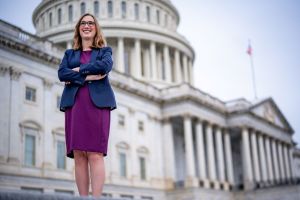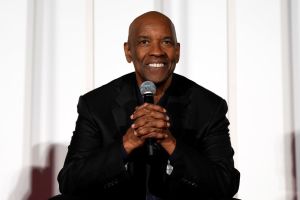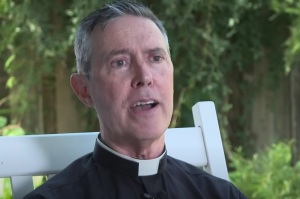America not as divided as media make it seem, Senate Chaplain Barry Black says
RZIM launches new initiative to foster 'exchange of ideas' amid political division
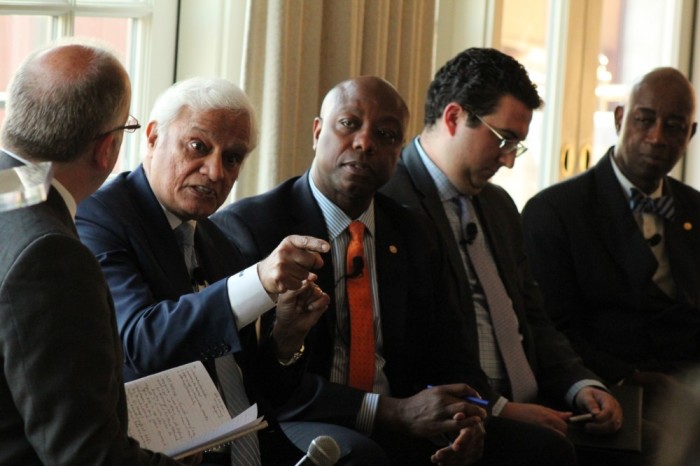
WASHINGTON — Christian apologist Ravi Zacharias launched a new initiative Wednesday evening, convening dozens of elected officials, senior government staff, business people and academic leaders from both sides of the aisle to discuss political division in the United States.
The inaugural Ravi Zacharias International Ministries “At the Table” event was held on the top floor of the historic Hay-Adams Hotel overlooking the White House, in which attendees engaged in a night of dialogue about the “hope for our divided nation” over dinner and drinks.
The new initiative will be a series of events engaging “crucial issues of the day through the prism of a Christian worldview.”
“At the Table” aims to be a place where the “exchange of ideas and hospitality meet.”
As much has been made in the media about the ongoing political divisions in the U.S., the night featured a 45-minute panel discussion featuring the 73-year-old Indian-born apologist and author, African-American Republican Sen. Tim Scott from South Carolina, U.S. Senate Chaplain Barry Black, and former Obama campaign faith outreach director Michael Wear.
Moderated by British journalist Rob Gifford, panelists pushed back against the notion that the nation is as divided as many make it out to be. Some contended that the nation is not nearly as divided as it has been in the past.
“I'm startled many times when I hear news people pontificating about how terrible things are,” the 70-year-old Black, a former rear admiral in the Navy, said.
“And I'm [wondering], ‘Is this an alternative universe that I'm looking at?’ Because I know what bad looks like and this is not as bad as it's been.”
Black, an African American, opined that too often “division is given a black eye” and told the story of how a Democrat senator recently told him that “this is one of the most challenging times in the history of humanity.” Black said he responded to the senator by saying that “slavery was pretty bad.”
“The reality is that there has always been division,” Black said. “Jesus, in His John 17 intercessory prayer, prays, ‘Father, make them one, as we are one.’ And when you look at some of the periods of division in the nation and what we've been able to overcome, you know, the question ‘Is hope possible?’ is almost rhetorical.”
“I tell journalists very frequently there hasn't been a caning on my watch,” he continued, referring to the caning of Sen. Charles Sumner in 1865 over the issue of slavery. “I’ve been in the Senate for 16 years. No one has walked over from the House and beat a guy into next week with a cane.”
Black even asserted that political division shouldn't bother Christians in America because of the promise made in Romans 8:28.
"If you believe Romans 8:28 — ‘In everything God is working for the good of those who love Him, who are the called according to His purposes’ — then division shouldn't bother you at all because God has used division," he said.
Gifford questioned Black on whether he was saying that things are not as bad as “we sometimes like to make them out to be.”
“We don't have the kinds of assassinations that we had. We don't have the towns burning that we had back in the day,” Black responded. “So yeah, I think we are very often hyperbolic and [claiming that] the sky is falling.”
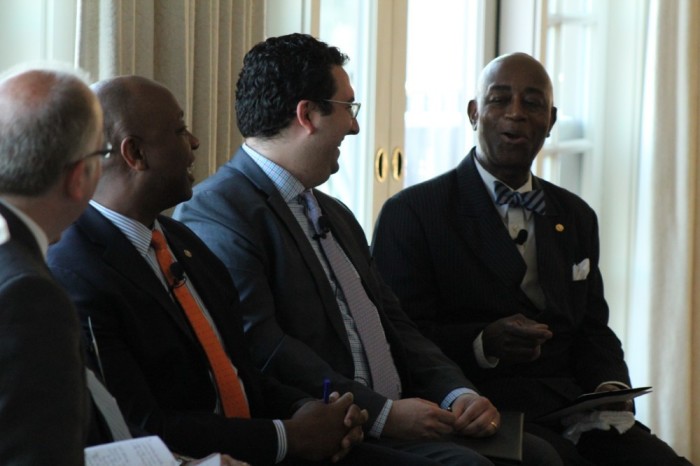
Zacharias followed up by stressing that one of the problems today is the capacity for people to communicate.
“We have this immersion of information. And in the United States, any news of five days ago is old news,” he added. “And unfortunately, instead of getting the news now, all we get is personality, assaults of personality descriptions. So rather than generating information for people, we are provoking them.”
“They say any stigma can lick a good dogma,” Zacharias continued. "And so you bring that person's name up and no matter what that person says, the reader is not going to like it. And this baiting an emotion on the basis of interpersonal dislikes is the wrong basis for which to inform.”
Scott, who has served in the Senate since 2013, said he is encouraged whenever he sees elected officials converse when there are no cameras around.
“Perhaps one of the greatest ills in our society today is the presence of cameras,” he said. “We sat this morning in a prayer breakfast with Republicans and Democrats having a conversation about loving your enemies. And the person speaking was a Democrat senator who said, ‘What they see on TV doesn't reflect what my experience has been even in the minority.’”
On any given week, Scott said, he can be found going to movies with a group of Congress members that include Republican Mark Walker of North Carolina, Democrat Joe Kennedy of Massachusetts, and House Minority Leader Kevin McCarthy of California.
“You'll find that myself and Sen. Chris Coons, a Democrat, did a small business event with Goldman Sachs. You'll find that myself and Cory Booker … the two of us have partnered on internship programs, on apprenticeship programs, and opportunities zones, on rare diseases,” he said. “But the friendships are on display. We break bread together when we do public events.”
“Unfortunately, I mean this sincerely, to get media coverage on any of the events I just talked about — including the legislation that could be life-changing, life-saving — it doesn't break through the threshold.”
Scott went on to talk about some of the bipartisan legislative successes that have been made in the last few years that he says the media didn’t pay attention to.
“We were able to, in a bipartisan fashion, get criminal justice reform done, to create opportunities zones, to work together for a new initiative from the White House on historically black colleges and universities, to now focus our attention on rare diseases with a bipartisan coalition working on that, and to reform the banking system with a bipartisan coalition getting it done,” Scott said.
“When you look at the successes that we've had in the last few years in a bipartisan fashion, you would say to yourself, ‘Why isn’t this ever reported on the news?’ It's because our stations — God bless them all — they had figured out you can monetize conflict. And as long as there's a boogeyman and I can tell you who that boogeyman is, it will drive my ratings up. And if my ratings are up, my profits are up. So what do I do? I do more of the same.”
Scott stressed that it is “more profitable to sell division than it ever has been once you're paranoid about division.”
“You see it everywhere,” he warned.
Scott reasoned that underneath the entire system is a “friendship that is flourishing in the nation's capital in a way that we haven't seen in a very long time.”
“But in many, many ways, the fights that we've been having for a century have been evaporating before our eyes. So we need something new to fight over,” he said. “And this fight is a more significant, more powerful fight because it's a fight of our origins. It's who we are from the Judeo Christian perspective. That's a current fight. But in so many ways, this nation has leaped forward.”
Wear, who served in the Barack Obama White House, said that politicians do bear some of the blame for helping foster “fear of the other.”
“You don't need to give $10 to any presidential campaign right now and look at the emails that will come in your inbox,” said Wear, the founder of Public Square Strategies. “And you will no longer be able to say that politicians aren’t playing a role in playing on the fear of the other side.”
Ultimately, Wear said, it comes down to the citizenry and what the citizens are “buying into.”
He contended that unless there is a citizenry that will stop the “incentive structure,” then the U.S. is not going to see the kind of change that people are looking for.
“We know that citizens respond to negative advertising in the way that they don't respond to positive advertising,” he said.
“We know that citizens will [turn] to news programs that play up conflict as opposed to talking about the FIRST Step Act and both sides coming together to get that done. You know, statesmen can only be statesmen for so long until they're elected out of office because there are people using more destructive tools that are available."
Follow Samuel Smith on Twitter: @IamSamSmith
or Facebook: SamuelSmithCP


















